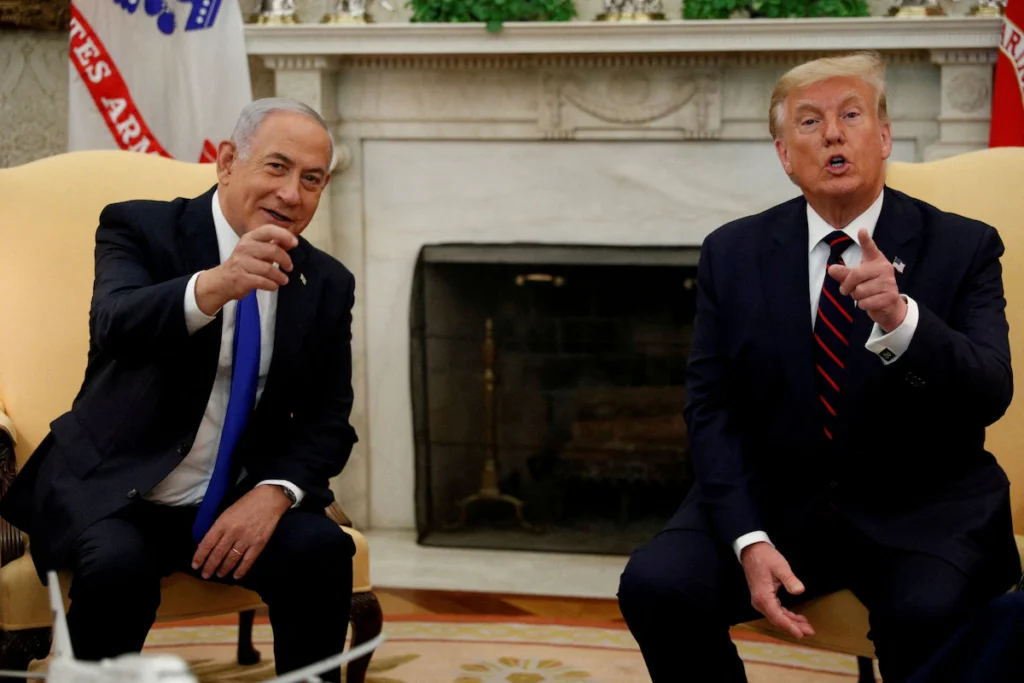President Donald Trump proposed permanently resettling Palestinians from Gaza in neighboring countries during a White House meeting Tuesday with Israeli Prime Minister Benjamin Netanyahu. Calling the war-torn enclave a “demolition site,” Trump suggested displaced Gazans would be better off relocating rather than returning to rebuild.

Trump reiterated calls for Jordan, Egypt, and other Arab nations to accept Gazans, stating they had “no alternative” but to leave. He added that resettlement should be permanent, expanding on earlier proposals that Arab leaders have previously rejected.
“If we could find the right piece of land and build them some really nice places with plenty of money, that would be a lot better than going back to Gaza,” Trump said before Netanyahu’s arrival. “I don’t know how they could want to stay.”
Speaking alongside Netanyahu in the Oval Office, Trump repeated his stance, saying Gazans should move “to nice homes where they can be happy and not be shot, not be killed.”
Trump did not provide specifics on how the plan would be implemented. His proposal aligns with Israeli far-right interests but contrasts with the previous Biden administration’s opposition to the mass displacement of Palestinians.
Hamas official Sami Abu Zuhri condemned the remarks, calling them an attempt at “expulsion from their land.” International legal experts have warned that forced displacement of Gaza’s population could violate international law.
The meeting was Trump’s first with a foreign leader since his return to office on Jan. 20. It highlighted U.S.-Israel ties following strained relations between Netanyahu and former President Joe Biden over Israel’s handling of the war in Gaza.
Trump and Netanyahu also discussed efforts to maintain a fragile ceasefire between Israel and Hamas and the potential for an Israeli-Saudi normalization agreement. The meeting came as mediators worked on the second phase of a truce and hostage-release deal.
The situation remains uncertain, with a parallel ceasefire between Israel and Hezbollah in Lebanon set to expire in the coming weeks. Concerns over Iran’s nuclear program also remain central to regional security discussions.
Trump’s resettlement proposal has sparked regional unease, with many countries questioning how his return to power will shape Middle East policy.
During his first term, Trump moved the U.S. embassy to Jerusalem and brokered the Abraham Accords, normalizing Israel’s relations with several Arab states. He has expressed interest in restarting talks to establish diplomatic ties between Israel and Saudi Arabia.
However, Netanyahu faces pressure from far-right members of his coalition, who have threatened to collapse his government unless military operations in Gaza resume. Renewed fighting could complicate Trump’s push for a Saudi-Israel deal.
The Biden administration maintained military support for Israel following Hamas’ Oct. 7, 2023, attack, but relations were strained over high Palestinian civilian casualties and Netanyahu’s refusal to heed U.S. calls for restraint.
Trump’s push for Palestinian resettlement could also impact broader diplomatic efforts, as Saudi Arabia has conditioned normalization on a clear pathway to Palestinian statehood.
“This is a critical moment in the region,” a U.S. official said. “Trump’s vision, Netanyahu’s domestic pressures, and the fragile ceasefire are all converging at once.”



